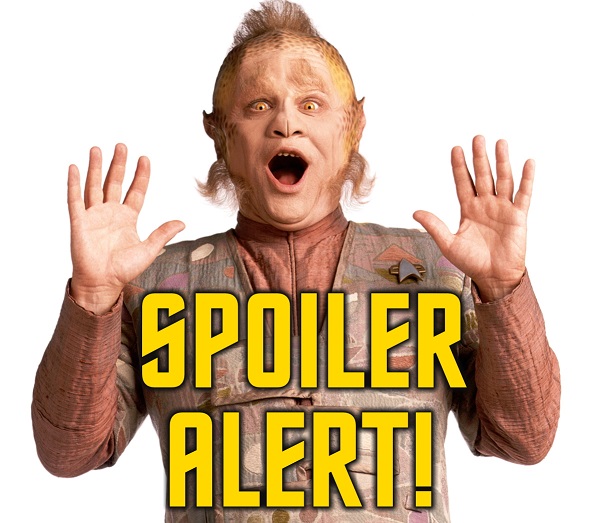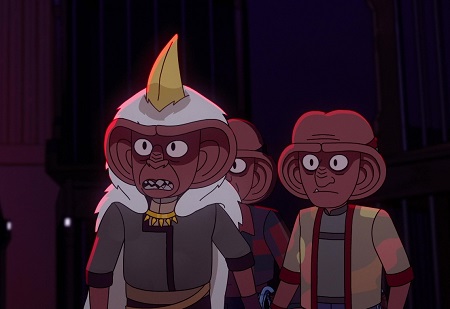
Spoiler Warning: There are spoilers ahead for Star Trek: Lower Decks Seasons 1-2, particularly the second season episode Mugato, Gumato. There are also minor spoilers for Star Trek: The Original Series, Star Trek: The Next Generation, and Star Trek: Deep Space Nine.
This article deals with topics of sex and sexuality and may be uncomfortable for some readers.
The plan for today was to talk about new video game Kena: Bridge of Spirits. But while the game downloads (20+GB will take a while on my crappy internet connection) I thought it would be interesting to address a bubbling controversy involving Star Trek: Lower Decks.
When I watched the episode Mugato, Gumato a couple of weeks ago, the scene at the centre of this controversy barely registered. I was enjoying the episode’s central pairing of Ensigns Boimler and Rutherford, who teamed up for their first major outing of the season and I felt played off one another exceptionally well. As the two ensigns stumbled into mugato territory having escaped from an away mission gone wrong, they found themselves trapped by a pair of mating mugatoes. A third mugato appeared and seemed to be pleasuring itself by rubbing its horn, something the ensigns commented on.
This moment, which lasted only a few seconds, is at the centre of the “adult content” controversy now engulfing Lower Decks. I found the whole conversation to be quite odd, and reminiscent in some ways of the relentless attacks by people like Mary Whitehouse and the National Viewers’ and Listeners’ Association in the 1970s – the kind of reactionary, social conservative “outrage” that inspired characters like The Simpsons’ Helen Lovejoy.

Picture Credit: BBC/Forge Productions via YouTube
When I watched Mugato, Gumato for the first time, I remember rolling my eyes at this moment. Masturbation jokes are pretty low-brow, and I didn’t think it was especially funny. As someone who is asexual, jokes about sex and sexuality can be uncomfortable for me, but this one wasn’t particularly. I didn’t find it hilarious, but I certainly didn’t find it offensive. In an episode that had other good jokes, a busy story, and some further development of Ensign Mariner’s character to hold my attention and interest, I simply wasn’t all that bothered about a fragment of a scene that was clearly meant to be a joke. In my original review I didn’t even consider the horn-joke worth making note of.
I’ve said before that Star Trek: Lower Decks is an animated comedy first and a Star Trek show second. Though it largely succeeds at “feeling like Star Trek” – a pretty nebulous, ill-defined concept that means different things to different people – it’s a show that very much occupies a space similar to the likes of The Simpsons, Rick & Morty, and even shows like Family Guy. Jokes like this one are thankfully infrequent, but to be expected, and after watching sixteen episodes of the show across two years, I’m surprised that some people still don’t fully appreciate that.

Humour is a very personal thing, perhaps second only to musical taste in terms of being purely subjective. A joke that one person considers hilarious will be boring or even offensive to another, and as long as comedy is well-intentioned and not punching down or deliberately picking on one group of people, I’m okay with that. I haven’t laughed at every single joke in Lower Decks just as I haven’t at every joke in other comedy shows. Humour sometimes misses the mark for all of us.
The conversation around this moment in Mugato, Gumato has taken a strange turn, though. Some fans seem adamant that this kind of sexual joke or sight gag is somehow inherently “un-Star Trek” or beneath what the franchise should aim to be. And I fundamentally disagree with that assertion. To anyone making such a claim, I want to ask: “have you ever seen Star Trek before?”

The Deep Space Nine fourth season episode Bar Association saw the character of Rom make a comparable reference to masturbation. Oo-mox, a Ferengi term for pleasurably stimulating their ears, had been depicted in The Next Generation and Deep Space Nine as a very intimate act, so when Rom said he was performing it on himself it was meant as a joke. It wasn’t the funniest joke in that episode, but it was in keeping with Rom’s characterisation at the time and with the way oo-mox (and other sexual acts) had been presented in Star Trek.
One of the things I liked about Star Trek when I was growing up and struggling with my own sexuality was that the franchise didn’t put things like sex and relationships at the centre of every story. But even going all the way back to The Original Series, where Kirk would have romantic entanglements with a different woman almost every week, Star Trek has had this sexual dimension to it. Sometimes sex has been presented as something casual or jokey, and at other times the franchise has taken a very serious approach to sensitive topics. But to say sex has never been part of Star Trek is patently false and just ridiculous.

One thing I admired about Mugato, Gumato is relevant to this discussion as well. The Ferengi poachers seen in the episode were harvesting the titular apes for their horns, then selling them on claiming the horns were an aphrodisiac. This environmental message parallels real-world poaching in Africa, where the trade in illegal rhinoceros horn is driving the species to extinction. It made sense, in that context, to see a mugato using its horn for some kind of sexual purpose.
When we compare Star Trek: Lower Decks to other animated comedies, there are far fewer of these low-brow jokes. Shows like Rick & Morty, Family Guy, and the like all lean far more heavily into sexual humour, and that’s something which is always going to be subject to taste. Personally, I prefer Lower Decks’ approach. These kinds of jokes can be funny – even to me – but the show is at its best when it finds ways to make the regular goings-on in Starfleet funny, or when it references obscure characters from past iterations of the franchise.

If you’re a regular reader and you saw my reviews of Lower Decks last season, you’ll know I’m not someone who would blindly leap to the show’s defence. I’m happy to criticise Lower Decks when I feel it misses the mark. For examples of that, take a look at my reviews of Season 1’s Envoys or Veritas, or even the Season 2 premiere, Strange Energies. In short, I’m not trying to defend the indefensible nor insist that Lower Decks can do no wrong.
I also feel that, as someone who is asexual, I have a different perspective on this. If the mugato masturbation joke was going to piss off anyone, it was going to be someone like me! It didn’t, because it just wasn’t that important. It wasn’t the focus of the episode, heck it wasn’t even the main focus of the scene in which it appeared. It was a throwaway sight gag that lasted all of a few seconds. The plot of the episode then moved on to other things. Like any joke, gag, or one-liner, it didn’t ruin the entire episode.

People with an outside agenda are often looking for the next thing to jump on to further their cause and generate controversy, and in this case the anti-Trek folks think they’ve found a winner in Mugato, Gumato. But I’d wager a lot of them didn’t even watch the episode in its entirety before deciding this was something worth discussing, and even if they did, can we really argue that one sight gag that lasted a few seconds in a single scene was that important? Good luck if you try to argue with some of these folks, though. Their minds are made up about Lower Decks – and the rest of modern Star Trek.
If you watched Mugato, Gumato and hated that joke, that’s okay. If it spoiled the episode for you, that’s okay too. I’m not in the business of telling anyone how to feel, and with humour being something so subjective I can understand how a joke that goes over particularly poorly can ruin someone’s enjoyment. But to try to reduce Lower Decks to one insignificant gag in one episode does the series a huge disservice. It does Mugato, Gumato a disservice too, as the episode had a great central character pairing in Boimler and Rutherford and also saw a significant moment for Ensign Mariner’s characterisation.

I’m surprised that this has become such a big deal. It’s ironic, in a way, that the people who are most likely to use terms like “snowflake” are often the ones to become so aggressive when they encounter a joke or a television show that they don’t like. And to me, that’s what I see happening here. Something minor that’s being blown out of proportion either by folks with very short memories who’ve conveniently forgotten comparable moments in Star Trek’s past, or by folks who have a deliberate anti-Trek agenda.
I wasn’t a big fan of that sight gag in Mugato, Gumato. I thought it was pretty dumb, but after rolling my eyes at it I quickly forgot about it. It just didn’t matter that much in the context of the episode or of the series as a whole. Trying to ignore everything else Lower Decks has done across its first season-and-a-half and focus on one tiny moment in one episode is nitpicking in the extreme. That particular joke was, I would argue, out of character for the series. Lower Decks prefers a more referential style of humour, one which draws on the lore and history of Star Trek. There are other sight gags and moments of cringeworthy humour for sure, but to try to claim that this is all Lower Decks is isn’t just wrong, it demonstrates an ignorance of what the show has been and what it’s achieved.
Lower Decks is better than jokes like that, and I can understand if some folks want to tell the writers and producers that they expect a higher standard of humour. As I said, it wasn’t something I personally found funny either. But I just don’t see why this has to be such a big deal. It’s not representative of Lower Decks as a whole, and it’s not indicative of a series somehow losing its edge and trying to cater to a low-brow crowd. It was a throwaway gag in an otherwise-decent episode. I didn’t care for it, but you know what? I’d all but forgotten about it within seconds. It was only when people kept dragging it up – to the point that series creator Mike McMahan felt the need to defend it in an interview – that I felt compelled to add my two cents to the conversation.
Star Trek: Lower Decks is available to stream now on Paramount+ in the United States and on Amazon Prime Video in the UK and around the world. The Star Trek franchise – including Lower Decks and all other properties mentioned above – is the copyright of ViacomCBS. This article contains the thoughts and opinions of one person only and is not intended to cause any offence.

